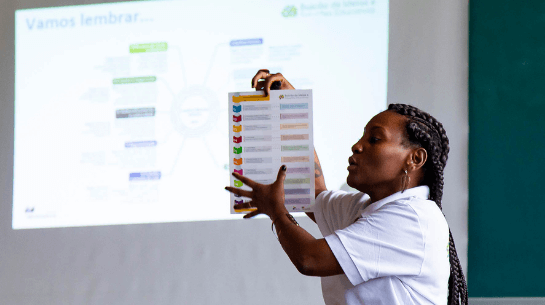- Products and Solutions

Renata Chagas, CEO of the Neoenergia Institute, reinforces the importance of intersectoriality
Governing and building public policies in an articulated way between different sectors is fundamental for education
Intersectoriality means the mechanisms of management and integration of actions, knowledge and efforts of different sectors of public policy, with the objective of building common objects of intervention among them, for the more articulated confrontation of social problems. Areas such as social assistance, education and health have data that, if used in an integrated way, and with actions thought together, can find solutions and collective solutions from these actions. Intersectoriality strengthens and brings together knowledge, practices and social and cultural structures between different sectors, so that they dialogue and join efforts in the joint execution of actions that benefit the citizen.
An example of this is the Counter of Educational Ideas and Practices,a program developed in partnership between the Neoenergia Institute and CIEDS - Integrated Center for Sustainable Development Studies and Programs. Through its training front, it empowers teachers and school managers with the objective of strengthening the training of school actors in the networks of municipalities in Bahia, São Paulo, Rio Grande do Norte and Paraíba, stimulating the creation of new educational practices, aligned with the ten General Competencies of the Common National Curriculum Base (BNCC), inspiring knowledge.
According to Renata Chagas, ceo of the Institute, "we saw that the experience of the Ideas Desk is a finding of the strength of intersectoriality, since complex problems need integration and articulation. That is, they need to be thought and resolved by various sectors. And that intersectoriality is imbued with a democratic dimension of participation in public policy-buildingdecisions."
Through the advisory front, it supports the management body of municipal networks, aiming to minimize the impacts caused by covid-19, considering the growth of inequalities and learning lags of students. Among its strategies, the promotion of intersectoral actions stands out, strengthening the links between the public sectors and closer ties with families to guarantee the right to education, health and care.
Throughout a collaborative process, which fostered greater articulation and integration among network professionals, innovative educational practices were co-created and implemented. Network intersectoriality is present, involving from families and teachers, professionals from education departments and other public sectors. A process that adapted to reality, such as the launch of the page "Education and Covid-19" on the https://www.cieds.org.br/balcaodeideias/platform, enabling education professionals to disseminate their contents and initiatives related to the pandemic context. The classroom courses had their version in DISTANCE considering the challenges of educational networks, such as difficulty in accessing the Internet and distance between schools and students' housing. Asynchronous courses (which can be done at any time) were created with the tutors, who used several strategies to support educators in the use of resources in this new reality.
The covid-19 pandemic required social distancing and gaped the need to bring the public sectors closer to each other and the population, to guarantee basic rights as the right to education and individual and collective health. The challenge is to articulate different federative entities at a distance, but there are good practices in progress that prove to be effective.
News
2025-10-30
Instituto Neoenergia anuncia finalistas e abre votação popular do Prêmio Inspirar 2025
2025-10-27
Neoenergia tem lucro de R$ 924 milhões no 3T25 com alta de 10% em relação ao 3T24
2025-10-15
Instituto Neoenergia leva Programa de Iluminação Cultural 2025 ao Museu Histórico Lauro da Escóssia
2025-10-03
Neoenergia amplia participação na hidrelétrica Corumbá III
2025-09-24
